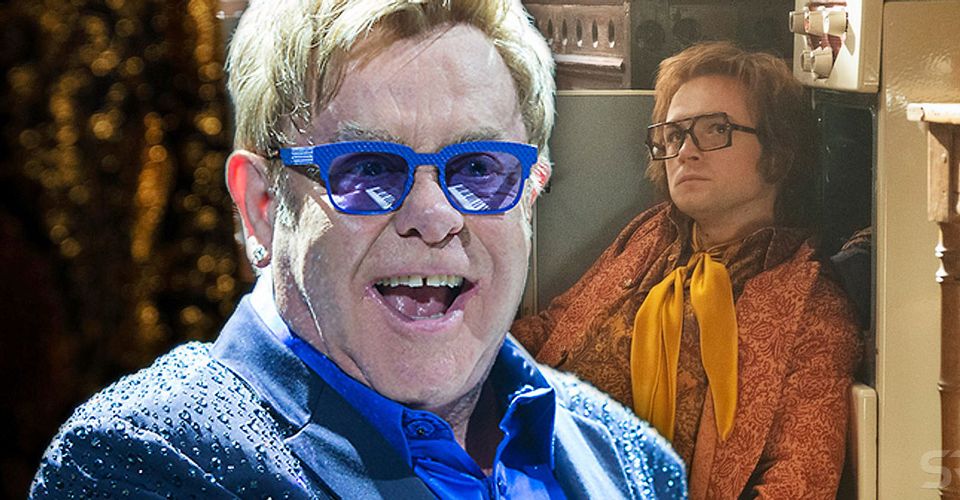Rocketman True Story: What The Elton John Movie Changes

Rocketman tells the true story of iconic artist Elton John, but it’s also a dramatization of his life, so fans may be wondering just how accurate the movie is to the singer’s story. The thing is, despite remaining faithful to many, many aspects of Elton John’s life, the Rocketman movie does sport some changes and eliminations in its effort to tell a good story.
Elton John was born Reginald Kenneth Dwight in 1947, and grew up in Pinner, on the outskirts of London. He showed an incredible aptitude for music at an early age, which won him a scholarship to the Royal Academy of music at the age of 11, where he attended Saturday classes for five years (via Elton John by Phillip Norman). By the time he was 15, he was playing in pubs and had formed a band called Bluesology (via Ultimate Classic Rock), and left school at the age of 17 to pursue a career in music. From 1962 to 1969, he and Bluesology toured and backed acts including the Isley Brothers and Patti LaBelle and the Bluebelles, and it was during this time in 1967 that he met his longtime partner, lyricist Bernie Taupin, and the two started working as staff songwriters for Dick James Music. While they wrote mostly for other artists for the first two years of their employment, in 1969 John released his first album, Empty Sky, followed shortly thereafter by Elton John in 1970. Elton John contained his first major hit, “Your Song,” and his star-power rose significantly after playing an historic show at the Troubadour in Los Angeles, opening with the hit to a small, but enthusiastic and influential crowd.
From 1970 to 1973, John produced three albums which spawned some of his biggest hits. “Tiny Dancer,” “Rocket Man,” and “Honky Cat” dropped in 1972, and “Crocodile Rock” and “Daniel” in 1973, and the hugely successful Goodbye Yellow Brick Road album also released in 1973, which included the title song as well as “Candle In the Wind,” “Bennie and the Jets,” and “Saturday Night’s All Right for Fighting” – all of which are featured in Rocketman at various points throughout the film, both in its PG and R-Rated periods.

It was also during this time that John began a relationship with drugs and alcohol – cocaine, in particular – that would follow him for much of the next two decades. While he still continued to produce successful music throughout this time in his career and his fame grew to celestial levels, his substance abuse dogged his image and relationships. John also lived privately as a homosexual, engaging romantic relationships with men, including with his manager John Reid. His sexuality was an open secret in the music community (less so to the public), so it shocked many when he announced his marriage to German sound engineer Renate Blauel in 1984. But the two would later divorce in 1988, and John has never had another public romance with a woman.
But it wasn’t until after he got sober in 1990 that he started seeing his current husband, David Furnish. The two met in 1993 and have been together ever since, getting married in 2014 and having two sons via surrogacy. Since 1990, he’s been sober for 28 years and has become a huge figure in AIDS awareness and support as a result of starting the Elton John AIDS Foundation in 1992. Rocketman itself has been a longtime project of his, and as he serves as executive producer on the film, audiences won’t be surprised to see that it closely follows John’s true story. But there were some interesting adjustments made in the transition from biography to musical.
Changes to Elton John’s Childhood and Rise

Rocketman begins with Elton John’s childhood in Pinner, living with his parents and grandmother. It depicts his father, Stanley Dwight, as a distant man, uncomfortable with showing his son even the most minimal affection. But despite their fraught relationship, Rocketman does credit Dwight with helping to cultivate John’s passion for music, given the older man’s love of jazz and rock and roll (via Your Songs Collectibles). While this was true, Rocketman leaves out the fact that John’s mother, Sheila (Bryce Dallas-Howard), was also a music fan, and contributed to the family record collection along with her husband. The biopic chooses to focus more on her dissatisfaction with her home life and marriage, as well as her penchant for nightlife and eventual second marriage to John’s stepfather, painter Fred Farefather, when John was 14. John has mentioned that his mother bringing home Elvis records was a formative experience in his early years (via Elton John), but the movie shows Farefather presenting his new stepson with an Elvis record as a gift.
As for his early music career, Rocketman centers almost solely on his performing career, largely sidestepping his work as a staff songwriter for Dick James’ (Stephen Graham) label, DJM Records. In reality, after meeting lyricist Bernie Taupin (Jamie Bell), the duo spent two years working for James, writing pop songs for artists like Roger Cook and Lulu (via Rolling Stone). Rocketman does show James railing at the two for not coming up with songs that were easy-listening enough, but it doesn’t really delve into the fact that John and Taupin worked for other artists before their own careers took off. However, the film does feature the true story of Taupin and John getting connected at John’s inaugural meeting with his first manager, Ray Williams (via The Late Show With Stephen Colbert). Taupin and John had both answered the same ad looking for songwriters, and since John was a pianist in need of lyrics, Williams handed him an envelope of Taupin’s songs to play with, and the rest is history.
Elton John’s Troubadour Gig Wasn’t Exaggerated, (But It Looked a Little Different (1970)

Rocketman places John’s first American gig at the Troubadour club in West Hollywood, and that part is true. It’s also true that Dick James arranged the booking, the club’s owner was Doug Weston (played by Tate Donovan), and that the show was so incredible it put John on the map after just one performance. That said, there are a few key details the film changes. For instance, the first song on the set list wasn’t “Crocodile Rock,” but “Your Song.” “Crocodile Rock” wouldn’t be written until 1973. And while drummer Nigel Olsson recalls seeing Neil Diamond in the audience (via Rolling Stone), Rocketman also places the Beach Boys there giving John a paralytic case of stage fright, but no record of their presence exists. However, the six-show run was such a success that it did attract its fair share of music glitterati, including Quincey Jones (via U Discover Music), as well as one of John’s personal idols, Leon Russel. As for whether or not it was there he pioneered his infamous piano jump, as the end of the first Rocketman trailer implied, there’s no confirmation it happened. Not that that means it didn’t.
John Lennon Wasn’t The Inspiration For Elton John’s Last Name

Rocketman implies that in his journey to creating a stage name, Elton John took his first name from one of his bandmates and his last name from legendary Beatles musician John Lennon. That’s half right. John did take the name Elton from one of the members of his band Bluesology – saxophonist Elton Dean (via YouTube). However, he took the last name John from another member of the band, vocalist and Canadian blues musician Long John Baldry (via The Guardian). Rocketman depicts John as coming up with the last name John after looking at a picture of the Beatles in Ray Williams’ office. It’s simply not true.
But this adjustment may have just been to pay homage to the pair’s eventual collaborations on Elton’s John’s cover of “Lucy in the Sky with Diamonds” and “Whatever Gets You Through the Night” on Lennon’s Walls and Bridges album. They also performed together at Madison Square Garden during Lennon’s final live performance (via Beatles Bible). Given the fact that John Lennon is arguably one of the few musicians in existence with a comparable legacy to Elton John’s, it’s possible Rocketman chose to skip over his work with Lennon so as not to muddy the film’s focus.
Changes to John Reid

Probably the area in which Rocketman takes the most artistic license is in its characterization of Elton John’s manager and lover John Reid. Richard Madden plays Reid, and Rocketman makes Reid one of the film’s primary villains, highlighting how predatory and ruthless he was as a manager, as well as interested in pursuing the relationship with John for its professional benefits as well as its romantic and sexual ones. The movie accurately renders the evolution of their relationship from lovers, to lovers and professional partners through the end of their romance and the eventual dissolution of their partnership. But Rocketman implies the romantic breakup was far more acrimonious than it may have been in real life, and it also neglects to point out Reid’s own issues with substance abuse.
John Reid and Elton John did end their romantic relationship and Reid has admitted the pairing was turbulent, as Rocketman presents. An article featuring Reid in the Scottish Daily Mail sheds some light on the music manager’s side of the story – their relationship only lasted from 1970 to 1975, and Reid attributes the end of their romance to John wanting to play the field. After what he describes as an amicable break-up, they continued to work together for two decades with Reid even serving as John’s best man at his 1984 wedding to Renate Blauel. Also, Reid credits John with helping him receive treatment for an alcohol addiction long before the singer would seek treatment for his own substance abuse issues.
That said, Rocketman does reference Reid’s careless spending of John’s money, which was, incidentally, the very thing that ended their professional relationship as well as their friendship in 1998. John was made aware of Reid embezzling money from him, and took him to court in 2000 for it. Reid wound up paying the singer £3.4 million (via The Telegraph), and according to Reid, they’ve been estranged ever since. John’s Marriage to Blauel is another romantic relationship featured in Rocketman, but where Reid’s role in John’s life was made more villainous, Blauel’s role was softened. Rocketman depicts Blauel as a gentle, kind woman, who’s disappointed but forgiving when her husband can’t continue their marriage in the face of his addictions. In reality, Blauel cut ties with John when their marriage imploded. The two eventually made amends, but not until the early 2000s (via Page Six).
Rocketman Ignores Elton John’s Record Label

Elton John left DJM Records shortly after he began to be managed by John Reid, and Rocketman does address their split, but it doesn’t address what he did after – at least not with much specificity. He actually started his own record label, Rocket Man Records. That’s where he signed several noteworthy artists, such as Neil Sedaka and Kiki Dee, with whom he would go on to record “Don’t Go Breaking My Heart.” Over the years, the label evolved into what’s become primarily an artist management company with clients like Ed Sheeran (via Billboard).
The Film Also Eliminates Ryan White

Rocketman depicts Elton John’s journey to sobriety as influenced by the toll that years of addiction took on his life, health, and relationships. Eventually he’s driven to rock bottom and walks out on a concert at Madison Square Garden to check himself into rehab for substance abuse, while still wearing an elaborate costume. No such concert happened, but what’s more, Rocketman makes no mention of someone John hugely credits with helping him get sober – Ryan White.
In the midst of the AIDS crisis, hemophiliac patient Ryan White contracted the disease through a contaminated blood transfusion. He and his family spent the rest of his life raising awareness about the HIV/AIDS virus and living with the disease. The teen was from Indiana and lived with the illness for some time, but when he attempted to return to school after a bout with pneumonia, his community objected out of ignorance. John became aware of the White family’s plight after reading about them in a magazine article, and soon after struck up a friendship with them. They grew close enough that John was by Ryan’s bedside along with Ryan’s mother, Jeanne, when the teen passed away in 1990 (via Washington Post).
John has since attributed his sobriety to his relationship with the Whites and how Ryan’s death helped John see how frail his own mortality was due to his use of cocaine. He’s said that within six months of Ryan’s death (via Express), he was sober, and he founded The Elton John AIDS Foundation in the teen’s honor. But while Rocketman mentions the AIDS foundation in its epilogue, no mention is made of Ryan White or his family at any time. That’s something that may make tongues wag, but the film chose to focus much of its story on John’s personal struggle with addiction. Including his experiences with the AIDS crisis and relationship with White would’ve overwhelmed the story. It’s also possible that the White family wasn’t keen on receiving the renewed spotlight that their inclusion would’ve thrown their way.
About The Author

















